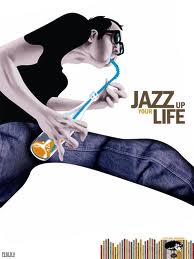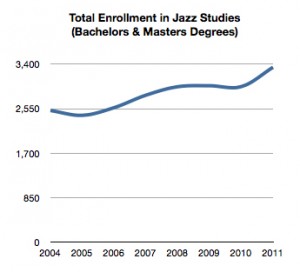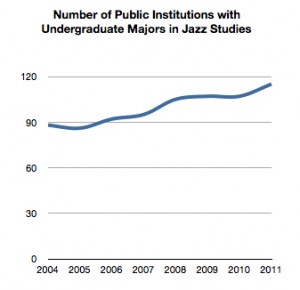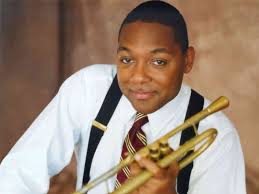Terry Teachout in his About Last Night posting “Jazz, by the numbers” conflates falling numbers of jazz cd sales with the health of the music itself. Understandable mixup, way too simple.
Feeling he was burned by criticism of his 2009 Wall Street Journal column about the National Endowment for the Arts Survey of ÂPublic Participation — in which Teachout wrote of jazz, “Nobody’s listening” (later NEA analysis of that survey’s findings here) — he takes pains to proactively defend himself for telling the truth about figures reported by Nielsen. The report shows jazz cd sales as neck and neck with classical music’s, above only childrens’ music, among the top 10-selling genres. The others are: Christian/Gospel, Country, EDM, Holiday/Seasonal, Pop, Latin, R&B/Hip-Hop and Rock. Rock tops all with 29% of what Nielsen calls “TOTAL CONSUMPTION  (ALBUMS + TRACK EQUIVALENT ALBUMS + STREAMING EQUIVALENT ALBUMS). What these numbers really say is that the aggregate record-buying audience is not buying as much “jazz” as it is buying something else. There doesn’t seem to be any indication that in recent years’ jazz album sales, low as they are, have changed much.
This information can be interpreted in many ways besides stating that jazz is in dread, perhaps fatal, decline, because people don’t like it. Chicken or egg? — that major record  labels have all but given up on jazz? And indie labels don’t have the resources to mount promotional campaigns that break through the media power they’ve established for pop stars (remember Elvis?) since the birth of rock ‘n’ roll? Is it chicken or egg that jazz doesn’t sell many recordings, when Nielsen reports, “Radio Remains Top Source For Music Discovery,” and there is indeed ever less jazz (especially current jazz) on radio? That trend has affected even non-profit college and community stations, but is embodied by programming policies of the behemoth iHeartMedia, Inc. (formerly Clear Channel Communications, Inc.) which offers only a strict diet of “Smooth Jazz,” a sub-genre overdue for refreshment? Isn’t it a self-fulfilling condition of low jazz records sales that purchase of on-demand music streams has grown 54 % over the period Nielsen measured, yet jazz producers for a variety of reasons don’t yet do much of that?
labels have all but given up on jazz? And indie labels don’t have the resources to mount promotional campaigns that break through the media power they’ve established for pop stars (remember Elvis?) since the birth of rock ‘n’ roll? Is it chicken or egg that jazz doesn’t sell many recordings, when Nielsen reports, “Radio Remains Top Source For Music Discovery,” and there is indeed ever less jazz (especially current jazz) on radio? That trend has affected even non-profit college and community stations, but is embodied by programming policies of the behemoth iHeartMedia, Inc. (formerly Clear Channel Communications, Inc.) which offers only a strict diet of “Smooth Jazz,” a sub-genre overdue for refreshment? Isn’t it a self-fulfilling condition of low jazz records sales that purchase of on-demand music streams has grown 54 % over the period Nielsen measured, yet jazz producers for a variety of reasons don’t yet do much of that?
I agree that selling jazz is quite a challenge in our current culture. Instrumental music of any type is secondary to vocal music of any type. There are no figures here on the sales of jazz singers vs. jazz instrumentalists, but no doubt Lady Gaga and Tony Bennett’s Cheek to Cheek released last September has sold more than Whiplash (Original Motion Picture Soundtrack) issued around the same time. Jazz has no industry lobbying organization to put on glamorous Awards shows, unlike the Country Music Association, BET, MTV, Billboard, NARAS –another chicken or egg situation? Maybe jazz musicians lack glamor, or just don’t make enough $$ to rate widespread interest in their drug use, sex scandals, violent outbursts, fashion choices, etc. — though I’m pretty sure some jazz musicians are still so involved.
True, there is no dominating, relevant jazz style today (did Wynton ensure that by focusing Jazz at Lincoln
Center from its start on “classical jazz”?). And nobody like Miles Davis who represents decades of cutting edge and often outrageous yet eagerly embraced new sounds. Indeed, some of the few well-recognized elders, such as Sonny Rollins, have suspended performing. But I personally am awed by the large number and vast variety of highly skilled musicians working hard, not goofing off, everywhere I go. I think we’re living in a period of significant jazz creativity, much of which isn’t being celebrated because platforms for such celebration have dried up, not because the music isn’t good. But without the celebration, buzz, discussion having a place, there’s less discussion, buzz, celebration going on.
For all that, Teachout’s implication that jazz people by and large telling potential listeners they should “enjoy jazz” — a la “eat your spinach, it’s good for you” — is errant. In 2009 he wrote,
If you’re marketing Schubert and Stravinsky to those listeners, you have
no choice but to start from scratch and make the case for the beauty of their music to otherwise intelligent people who simply don’t take it for granted. By the same token, jazz musicians who want to keep their own equally beautiful music alive and well have got to start thinking hard about how to pitch it to young listeners—not next month, not next week, but right now.
And now he says, “For the most part, they didn’t—and the results of their refusal to face the facts are now painfully clear.”
 Well, the promoters, producers, presenters and publicists I hear from have been focused for at least the past six years on using every imaginable and affordable approach they can come up with to sell jazz performed live, especially in non-profit venues, as exciting, cool, fun — music that can improve your self esteem, mark your sophistication, raise your social status, get you high in many ways and maybe even laid.
Well, the promoters, producers, presenters and publicists I hear from have been focused for at least the past six years on using every imaginable and affordable approach they can come up with to sell jazz performed live, especially in non-profit venues, as exciting, cool, fun — music that can improve your self esteem, mark your sophistication, raise your social status, get you high in many ways and maybe even laid.
A generation of students seems to have been convinced; according to the National Association of Schools of Music, enrollments in higher education courses in jazz increased 33% from 2004 to 2013. The staging of and audiences for jazz festivals has seemingly grown, too, though my evidence is only anecdotal; aggregate numbers are hard to find.
Association of Schools of Music, enrollments in higher education courses in jazz increased 33% from 2004 to 2013. The staging of and audiences for jazz festivals has seemingly grown, too, though my evidence is only anecdotal; aggregate numbers are hard to find.
Whether any of this will affect a turnaround for jazz popularity, or simply sustain the bubble I live in (have I blown it myself?) with an international coterie of jazz devotees is impossible to say. But we are a hearty bunch, eager for both artistic enlightenment and pleasurable entertainment
 The best jazz offers both at once. If that appeals to “otherwise intelligent people,” jazz per performance, cd or practitioner offers more varieties of the mix than most musical genres that have flourished better in the past half-century of cultural and commercial flux. Big thanks to Terry Teachout, biographer of enduring jazz icons Louis Armstrong and Duke Ellington, for bringing to light news about jazz recordings’ current lame sales.
The best jazz offers both at once. If that appeals to “otherwise intelligent people,” jazz per performance, cd or practitioner offers more varieties of the mix than most musical genres that have flourished better in the past half-century of cultural and commercial flux. Big thanks to Terry Teachout, biographer of enduring jazz icons Louis Armstrong and Duke Ellington, for bringing to light news about jazz recordings’ current lame sales.
howardmandel.com
Subscribe by Email |
Subscribe by RSS
Follow on Twitter
All JBJ posts |
[contextly_auto_sidebar id=”ksAJ9SezOK4JCqdmtxDwMmZSSoEpYZVo”]


